- Home
- Tim LaHaye
The Regime: Evil Advances / Before They Were Left Behind Page 4
The Regime: Evil Advances / Before They Were Left Behind Read online
Page 4
“Sir?”
“As you know, occasionally we get asked for referrals if there is ever a need for backup for the president or the vice president. Such opportunities are rare, because the full-time job always goes to a military pilot, and there are several pilots ahead of you on the sub list. But a lot goes into a recommendation. Even a man’s looks. How he wears the uniform, carries himself, deals with the press. There might be a hundred men more qualified than you on our team across the country, but your little brush with notoriety made you visible. So, good for you.”
Rayford was flattered, of course. He didn’t expect anything to materialize from the Air Force One thing, given that substituting was mostly honorary and there were several ahead of him. But it did get him thinking about whether a big honor like that should be a career goal. He’d not had a dream higher than where he sat every few days—in the cockpit of a 747. And yet he couldn’t shake the feeling that something had been nagging him. Had he peaked too soon, achieved his goals, realized his dreams?
On the flight back, since he had already had a couple of belts in Gustafson’s office, Rayford surprised himself and wondered if he noticed a double take on Halliday’s part when he accepted a couple more hard drinks.
“Glad you’re just a passenger,” Earl said.
Rayford laughed a little too loudly. “Don’t worry,” he said. “You know me.”
“Thought I did.”
“C’mon, Earl. We’re celebrating, aren’t we?”
In truth, Rayford had never been a problem drinker. He rarely got drunk, even on the golf course, sipping beers for four or five hours at a time on Saturdays and as soon as he could get away from home after church on Sundays.
Maybe that was his problem. He felt guilty leaving Irene with the kids for the better part of the weekends he was home. And yet he told himself—and her when she mentioned it—that he deserved his own time. He worked hard. His job was high stress.
So many shots of the good stuff in one afternoon was unusual enough for Rayford that they knocked him out and he slept soundly, even through dinner—normally pretty good in first class.
“That’s quite all right,” Halliday said later. “I needed your butter and your dessert anyway.”
“Not like me,” Rayford said. “I usually sleep light enough that smells wake me, especially hot food right under my nose.”
Still logy, Rayford was long enough from his last drink to trust himself to drive home. But this was the day Irene had her meeting with Jackie. Well, the women saw each other almost every day, but this was the official one, the study one, their own little mentoring-and-accountability group. Deep down Rayford wished he had a friend like Irene did. But still he dreaded her rambling accounts of all that had gone on.
These days there was a light in Irene’s eyes, a glow he both resented and envied. Rayford decided to just settle in and listen, because he was going to get both barrels anyway. He was not, however, prepared for today’s account.
“Jackie had some stuff to do today,” she said at dinner. “So she gave me a practical assignment.” Irene paused, as if waiting for Rayford to ask what that meant.
He would not bite. It was enough that he was giving her eye contact and not showing his boredom.
“I was to pick someone on my prayer list and do something specific for them today.”
She’s going to say she picked me. And I wonder what she did for me.
“I chose your parents.”
“My mom and dad?”
“Those would be your parents, yes, Rafe.”
She had his attention. “Yeah, I know, but what? What did you do?”
“I visited them.”
“In Belvidere?”
“Where else, hon? It’s not like they get out much.”
“You drove all the way to Belvidere?”
“No, I took our helicopter. Thanks so much for providing that.”
“Stop being so snippy, Irene. I mean, seriously? You drove to Belvidere on a weekday, without me, to see my parents?”
“I thought you’d be pleased.”
“Pleased? I’m . . . I’m speechless. I’m dumbfounded. Frankly, I didn’t know you cared. That much, I mean.”
“You know what, Rayford? I never did care that much before. I mean, they were your parents and I liked them all right. But your father has not really been with us mentally for years, and your mother is hard on his heels. But ever since I started praying for them, I—”
“What do you pray for them? It’s not like they’re going to be healed of Alzheimer’s.”
“No, I know. I pray for their souls. I pray they’ll have moments of lucidity and that when they do, someone will be there to interact with them. I pray they’ll have more good days than bad, that God will comfort them, that they will have peace and safety, and that the staff at the home will be kind to them.”
Rayford didn’t know what to say. He was moved. Touched deeply, actually. “Thank you, Irene,” he said, surprised by a catch in his throat. “That was a very nice thing you did for me. For my parents, I mean.”
She hadn’t said it was for him. It was for his parents. They were the objects of her prayers. But it also had been a gift to him. That his wife would see him off to the airport, get Chloe to school, bundle up Raymie, and make that drive . . . well, talk about above and beyond the call.
FIVE
THIS WAS THE DAY. And Nicolae was ready. He had risen early and followed a hard, sweaty five-mile run with a vigorous half hour on the rower and a weight-lifting set. In the shower he rehearsed his pitch and could barely wait to get to the phone. He had to wait until midafternoon to allow his target in the United States to begin his workday, so Nicolae filled his morning checking in on staff and staying atop everything.
When the appointed time came, he rubbed his hands together, sat back with his feet on his desk, reminded himself of everything he knew about his prey and the product, strapped on his ear set, and called the CEO of Corona Technologies in New Orleans, Louisiana.
Nicolae spoke fluent French and even tossed in a Cajun flavor, clearly impressing the man. “Jimmy!” he began. “How are things in the Bayou today?”
“Couldn’t be better, Mr. Carpathia,” James Corona Jr. said. “Just closed my biggest sale ever.”
“Well, you will be able to break that record in a few moments if we can come to an agreement. This will be your lucky day.”
“It already is, my friend. But you’ll be hard-pressed to top a one-hundred-and-one-million-dollar deal.”
Nicolae froze. A hundred and one? What were the odds? He buried his pique and calmed himself.
“What can I do for you?” Corona said.
Deflated but determined not to show it, Nicolae outlined his plan to purchase enough hardware and licensing to tie off the Romanian markets first, and then to become the exclusive distributor of Corona’s oral-cellular technology in all of Europe.
Corona responded with a throbbing silence.
“This makes your other sale appear insignificant now, no?” Nicolae said, suddenly suspicious.
“No.”
“Really? You must be on a roll, Jimmy.”
“A roller coaster is more like it, Nicolae.”
“How so?”
“I cannot sell to you.”
Nicolae swung his feet from the desk and stood. “You are joking.”
“I’m not. I wish I were.”
“Why?”
“Your territory has been taken.”
“By whom?”
“You know I’m not at liberty to reveal—”
“Tell me who, Jimmy, or never get another dime’s worth of business from me.”
“You’re a friend, Nicolae, and a treasured customer, but I cannot violate trade laws like that.”
“You know I will find out soon enough.”
“I have no doubt, and more power to you.”
“What else do you have, Jimmy?” Nicolae said, having switched to English now.
“I don’t follow.”
“What is on the horizon? Give me something cutting-edge, something I can use to break the back of my competitor.”
“But you said you would never do business with me again.”
“Do you want the money or not? I have a hundred million to burn. And I will add two to it just for good measure.”
“That’s the trouble, Nicolae. It would be too much of a risk. This would be something I have not even dreamed of offering anyone yet. It’s too embryonic.”
“Try me.”
“We’re just in the development stage.”
“Then you could use a hundred million. A hundred and two.”
“Could we ever. But I wouldn’t do that to you, Nicolae.”
“I insist. At least tell me what it is.” Carpathia was pacing now, gazing out his glass walls at the mountains that bore his name.
“Cellular-solar technology.”
“Tell me more.”
“This is classified.”
“You can trust me. I have just been kicked in the teeth by an unnamed competitor, Jimmy. I am what you would call a motivated buyer.”
“Investor is more accurate. If you buy product, it’s on you to succeed with it. If you invest in this, we become partners and we could both lose everything.”
“Fine. Stipulated. What is cellular-solar technology?”
“Just what it sounds like. We launch proprietary satellites far enough from the earth that the sun reaches them twenty-four hours a day, allows them to relay energy and signals and information to each other, and they power your electronic gadgets for free.”
“I am in.”
“Nicolae, you’re responding emotionally. I haven’t even bid this out yet, haven’t talked to our top people, haven’t—” br />
“Money is going elsewhere if you let this slip through your fingers, Jimmy. Tell me I am in.”
“Okay, all right, you’re in. I’ll get back to you as soon as possible with the details. You know, of course, there are zero guarantees on this one. We have no idea where it will go, whether it will work, whether there’ll be a market for it—anything.”
“If it does what you say it will do, there will be a market,” Nicolae said. “And if there is not, I will create one.”
Irene had always been a creative, fastidious homemaker, but after what she had told Rayford about her new interest in and care for his parents, he began to notice more and more around the house that impressed him. Like any other mother of young children, Irene had often been frazzled, short-tempered, not averse to raising her voice at the kids and him. He rarely saw that anymore.
It wasn’t that she was perfect. She was not. But she was quick to apologize, to make up for outbursts, to soothe hurt feelings, to break and ease tension. He couldn’t deny it. She really was becoming a different person.
That had a strange effect on Rayford. On one hand, he was drawn to her the way he had been when they met. On the other, getting too close to her scared him. It was as if she were a mirror to his own soul, and he didn’t like what he saw there.
Rayford had always considered it a gift to know how to look out for number one. He hadn’t seen it as self-centered. Real men called this ambition and drive. Nobody handed anyone anything in this life. You had to reach out and take what you wanted, become master of your own destiny, captain of your own soul. He had earned everything he had achieved, including time for himself. It was time to do something for Rayford.
So when his buddies wanted to play golf Sunday mornings instead of Sunday afternoons, he told Irene he was going to ask the church brass to consider adding to the schedule what was known among his Catholic friends as “Fisherman’s Mass.”
“A Saturday night service,” he said. “Lots of churches have them. They originated for men who went fishing before dawn on Sundays. Well, it ought to hold that they would accommodate us golfers too.”
“I can’t see it,” Irene said. “You know how long it took to get the new foyer carpeting through all the committees. It would take months to move on something like this, and it would require a congregational vote.”
“In the meantime, I may have to miss a few Sundays.”
“Really.”
“Don’t look at me like that, Irene. I didn’t promise you I’d go to church every Sunday.”
“No, but you promised Someone, and if I were you, I’d be more worried what He thought about this.”
“I think God understands. And He helps those who help themselves.”
“Does He really? I don’t suppose you can support that with chapter and verse.”
“It’s in there somewhere.”
“No, it isn’t. Because I tried that line on Jackie, and she caught me on it. It sounds good. Even seems to make sense. But it’s not there. You know what though, Rafe? I would support your Saturday night church attendance and even be happy to see you off to the golf course at dawn the next day.”
He stopped and squinted at her. “What’s the catch?”
“Small as New Hope is, they have a Saturday night service.”
“Forget it.”
“I thought you wanted my blessing.”
“I don’t need your blessing, Irene.”
“My permission then?”
“I’d better not need that either.” That made her cloud over, but right then Rayford didn’t care. “I shouldn’t have to ask my wife if I can go out and play.”
Their mild tiff niggled at Irene for hours. Rayford could be so frustrating. And yet was trying to match him jibe for jibe the way to reach him? She feared not.
SIX
NICOLAE CARPATHIA became consumed with ferreting out his competition at Corona Technologies. He had an idea, of course. And when Reiche Planchette came to report on his task of getting Nicolae into the Romanian military academies in a hybrid role, Carpathia changed the subject.
“You wanted a civilian student and adjunct instructor position,” Planchette began. “It might interest you to know—”
“Someone is leaking information from somewhere, Reiche, and I want to know who.”
“Leaking, sir?”
“From within Carpathian Trading or from Intercontinental.”
“Oh, I doubt the bank would risk that, Nicolae. And I’d hate to think you face treachery from within.”
“That kind of naïveté will result in more of the same, Reiche. Get Ion in here. Let us find out if he has an opinion regarding anyone from the bank meeting the other day.”
“Ion?”
“Yes! Ion!”
“Well, I was under the impression he had left us.”
Carpathia cocked his head. “Left us? Without my knowledge? Impossible.”
“Actually, I am quite certain. He has taken a similar position with a firm in Moldova.”
“This cannot be! No notice? No one informing me?”
“I just assumed that if I knew, you knew. Would not Personnel have kept you in the loop?”
“Apparently not, Reiche. When did Ion leave?”
“Just days ago.”
“No severance, I hope. I mean, not giving any notice. Amazing. Tell me he did not join a competitor.”
“Oh, he did indeed, Nicolae. I am so sorry you were not informed. I would have told you myself, had I only known—”
“You should have!”
“—that you would have been left out of the normal protocol. From now on I will be sure you are kept informed of every eventuality.”
“Not Tismaneanu. Tell me Ion did not go to work for Emil.”
“Good call, sir. That is precisely where he has gone.”
Nicolae stood and slammed a fist on his desk. “Tismaneanu Tech is owned by a crook, and everyone knows it. Emil lives here so he can serve in the Adunarea Deputatilor, and yet everyone knows he really lives in an apartment in Galati, just this side of the border from his headquarters in Moldova!”
Planchette sat nodding solemnly, which only infuriated Carpathia more. If Reiche knew all this, why didn’t he do something about it? Why didn’t Nicolae himself?
“Well, I am glad he lives here, Reiche. Do you know why?”
“Tell me, Nicolae.”
“Because I live here too.”
Reiche looked blank. What a dolt for a man so revered in spiritual circles.
“He is looking for a third term as a deputy in the lower parliament,” Nicolae said. “How would he like to be soundly defeated by a newcomer?”
“You’re not saying—”
“Of course I am saying! Hold on a minute.” Nicolae sat at his desk and called Corona Technologies in the States. “Jimmy,” he said at last, “Nicolae Carpathia here. All right, I found out it was Tismaneanu who got the contract with you for Europe.”
“You didn’t hear that from me, Nicolae.”
Carpathia glanced at Planchette and raised a fist. “No, you are in the clear. But I need to know they have only the oral-cellular deal and are not privy to cellular-solar.”
“That is correct. I have told no one but you about the latter. And frankly, my people are excited about your confidence in us.”
Irene was more than curious. She was desperate to know. “Jackie, can people with dementia or even full-blown Alzheimer’s become believers?”
“In a lucid moment, who knows? It would obviously have to be a work of God in more than one way. They would have to be clear of mind long enough to understand what someone was saying, and that someone would have to be there at the right time. And then the patient would have to be receptive.”
“You can imagine what I’m praying for, Jackie.”
“Of course. How bad is Mrs. Steele at this point?”
“She has the most promise. There’s little doubt it’s Alzheimer’s, but for now she has just short-term memory loss, a lot of confusion. And she’s starting to get agitated.”
“And Mr. Steele?”
“We’re losing him. He’s not with us much of the time, but rather than being spaced out like a lot of his fellow patients, he’s upset. It’s as if he knows he should be able to remember things, express things, all that. But he just can’t.”

 Glorious Appearing: The End of Days
Glorious Appearing: The End of Days Left Behind: A Novel of the Earth's Last Days
Left Behind: A Novel of the Earth's Last Days Kingdom Come: The Final Victory
Kingdom Come: The Final Victory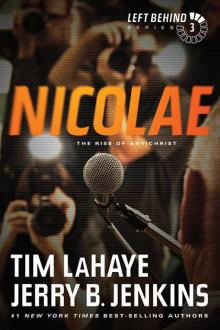 Nicolae: The Rise of Antichrist
Nicolae: The Rise of Antichrist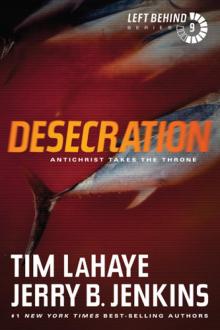 Desecration: Antichrist Takes the Throne
Desecration: Antichrist Takes the Throne Mark's Story: The Gospel According to Peter
Mark's Story: The Gospel According to Peter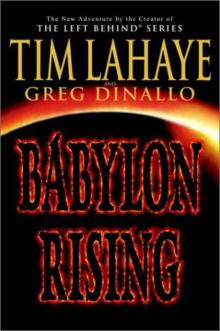 Babylon Rising
Babylon Rising Thunder of Heaven: A Joshua Jordan Novel
Thunder of Heaven: A Joshua Jordan Novel The Edge of Darkness
The Edge of Darkness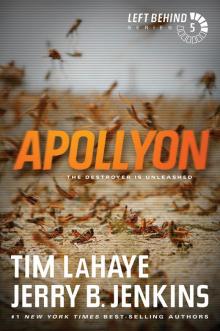 Apollyon: The Destroyer Is Unleashed
Apollyon: The Destroyer Is Unleashed Armageddon: The Cosmic Battle of the Ages
Armageddon: The Cosmic Battle of the Ages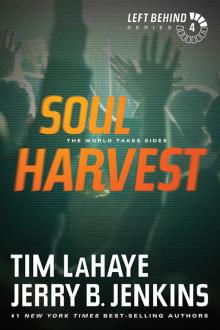 Soul Harvest: The World Takes Sides
Soul Harvest: The World Takes Sides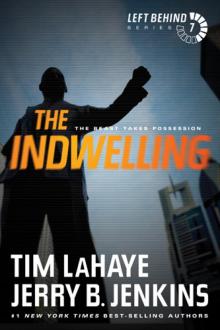 The Indwelling: The Beast Takes Possession
The Indwelling: The Beast Takes Possession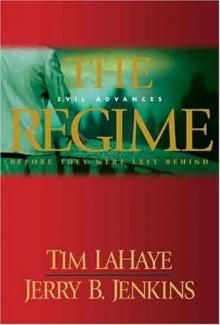 The Regime: Evil Advances
The Regime: Evil Advances The Rapture: In the Twinkling of an Eye / Countdown to the Earth's Last Days
The Rapture: In the Twinkling of an Eye / Countdown to the Earth's Last Days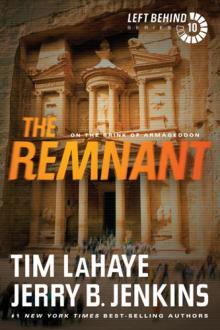 The Remnant: On the Brink of Armageddon
The Remnant: On the Brink of Armageddon John's Story: The Last Eyewitness
John's Story: The Last Eyewitness The Europa Conspiracy
The Europa Conspiracy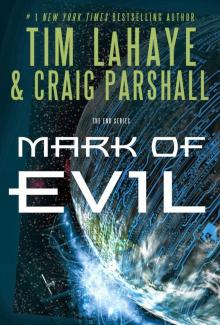 Mark of Evil
Mark of Evil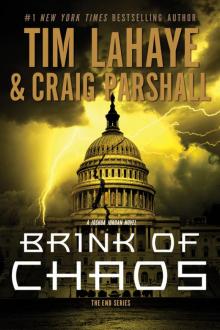 Brink of Chaos
Brink of Chaos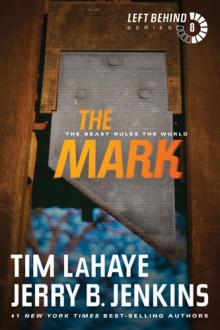 The Mark: The Beast Rules the World
The Mark: The Beast Rules the World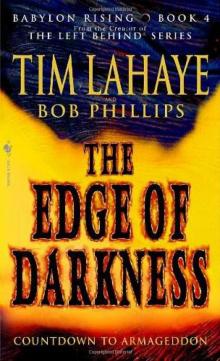 04 The Edge of Darkness
04 The Edge of Darkness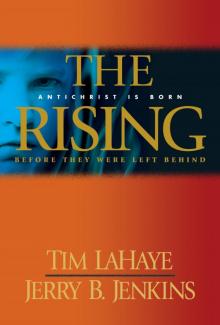 The Rising: Antichrist is Born / Before They Were Left Behind
The Rising: Antichrist is Born / Before They Were Left Behind Babylon Rising: The Edge of Darkness
Babylon Rising: The Edge of Darkness 03 The Europa Conspiracy
03 The Europa Conspiracy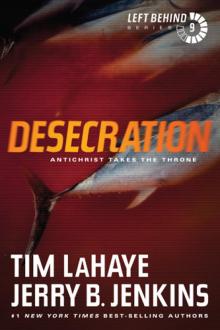 Desecration
Desecration Left Behind
Left Behind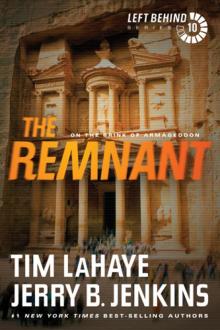 The Remnant
The Remnant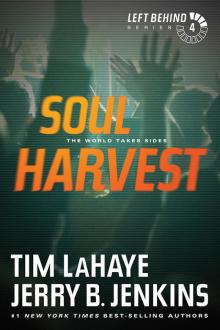 Soul Harvest
Soul Harvest Left Behind Book 13: Kingdom Come The Final Victory
Left Behind Book 13: Kingdom Come The Final Victory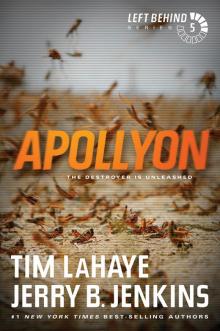 Apollyon
Apollyon 02 Thunder of Heaven: A Joshua Jordan Novel
02 Thunder of Heaven: A Joshua Jordan Novel Glorious Appearing
Glorious Appearing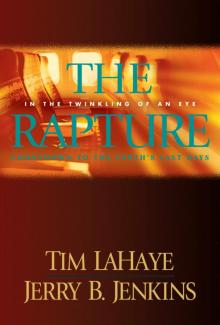 The Rapture: Evil Advances / Before They Were Left Behind
The Rapture: Evil Advances / Before They Were Left Behind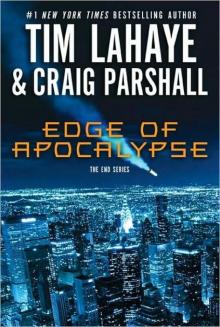 Edge of Apocalypse
Edge of Apocalypse Tribulation Force
Tribulation Force The Left Behind Collection: All 12 Books
The Left Behind Collection: All 12 Books Black Friday
Black Friday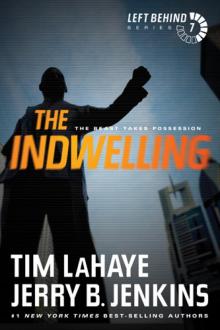 The Indwelling
The Indwelling The Left Behind Collection
The Left Behind Collection